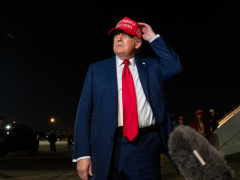On June 16, The New York Times disclosed that United States President Donald Trump is considering broadening his travel ban list to include as many as 36 additional countries, most of them African – including my country, Zimbabwe.
Twelve days earlier, Trump had enacted a proclamation barring citizens from 12 nations from entering the US. Seven of them – Chad, Congo Republic, Equatorial Guinea, Eritrea, Libya, Somalia, and Sudan – are African.
He also imposed partial travel restrictions, rather than a complete ban, on individuals from Burundi, Cuba, Laos, Sierra Leone, Togo, Turkmenistan, and Venezuela. Citizens from these nations are barred from permanently relocating to the US or obtaining tourist or student visas.
As promised on the campaign trail, Trump is cracking down on immigration.
For the first time in my life, I now face the extraordinary prospect of being barred from travelling to the US – a nation that several of my family members and friends call home.
My cousin, Dr Anna Mhaka, for example, completed her medical studies and practised exclusively in the US. Spencer Matare, a former classmate, has lived in Indianapolis for more than two decades and is a US citizen.
Despite the Trump administration’s political grandstanding and vilification of migrants – both legal and undocumented – Anna and Spencer, like millions of others, are industrious, law-abiding members of US society.
I know many in Africa hope to follow in their footsteps, and are deeply alarmed by the growing barriers to migration that Trump has erected.
Yet, I am not one of them.
Since graduating from the University of Cape Town in 1997, I have never felt inclined to travel to America – let alone live there.
I recognise that this makes me something of an anomaly.
I come from a time and place where the West was idealised – romanticised through the assimilated lens of an Anglicised upbringing. That longing was all around me, not just in my community but across the African continent, shaped by the enduring legacies of French, Portuguese, Spanish and British colonial rule. Yet it was never mine.
On International Migrants Day – December 18, 2024 – Afrobarometer released a report based on data from 24 African countries. It found that 49 percent of Africans had considered emigrating, with North America and Europe the top destinations – though a significant number preferred relocation within Africa.
Nearly 49 percent cited the search for better work opportunities as their reason for wanting to emigrate; 29 percent pointed to poverty and economic hardship.
Many Africans still believe in the “American dream” – or its European equivalent – and I do not begrudge them. Across the US, Africans have found success in business, academia, and sport. The late NBA star Dikembe Mutombo, from the Democratic Republic of the Congo (DRC), is a case in point.
During his lifetime, Mutombo donated $15m of his wealth to establish the Biamba Marie Mutombo Hospital in Kinshasa – a $29m medical and research centre built in memory of his mother, who died in 1997 after failing to receive timely care.
Her tragic, though common, story reflects the deep-rooted socioeconomic challenges across Africa – the very conditions that continue to drive emigration: Broken healthcare systems, entrenched corruption, unemployment, poverty. In contrast, the US often appears as a refuge.
A January 2022 report by the Pew Research Center on Black immigrants in the US showed that African-born Black immigrants are among the most recent arrivals: Three-quarters came in 2000 or later, with 43 percent arriving between 2010 and





